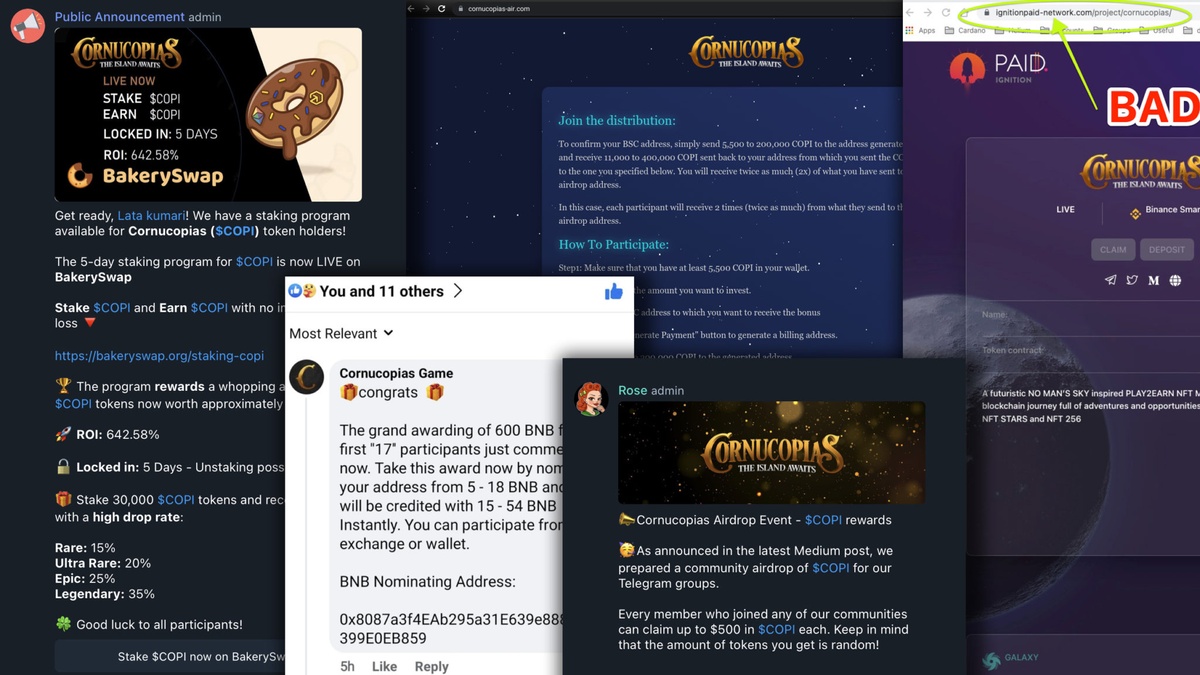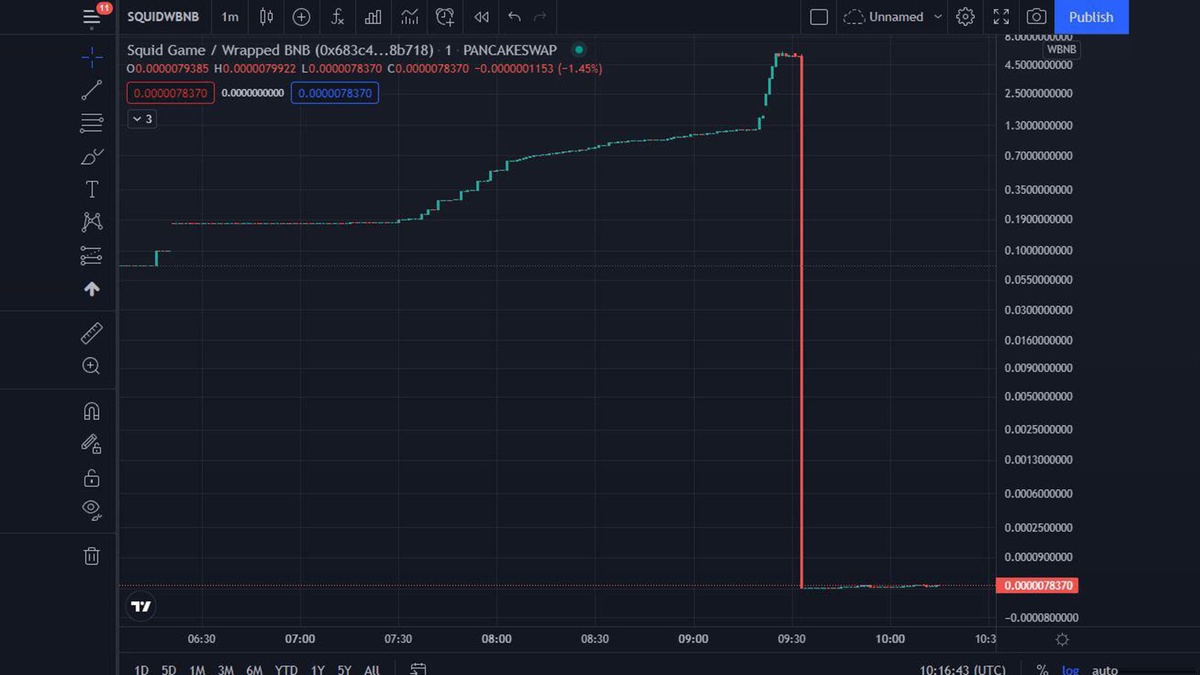The Cornucopias Crypto Scam Prevention Manual
Venturing into the world of cryptocurrency comes with inherent risks. Getting scammed should never be one of them.
But unfortunately, this is all too common. According to the Chainalysis 2022 Crypto Crime Report, “scams were once again the largest form of cryptocurrency-based crime by transaction volume, with over $7.7 billion worth of cryptocurrency taken from victims worldwide.”
As Cornucopias’ community continues to grow, it becomes increasingly important to equip all newcomers with the knowledge they need to avoid being scammed.
“But COPIWatch,” you say, “only newbies get scammed.” That may be true, oh Cornucopian. But don’t forget that you too were once a crypto padawan.
The Cornucopias metaverse continues to attract new community members from the general public and the traditional gaming industry. However, the sentiment from both groups towards crypto is not favorable. Again, this is due to the proliferation of scams across the industry.
The best way to prevent future Cornucopians from getting scammed is to preempt the scammers by nurturing a scam-resistant community culture. But to avoid the scammer, you must first understand the scammer.
Scammers: Scourge of the Crypto Space
Human beings have been scamming each other since before the ancient Sumerians started recording financial transactions on cuneiform tablets. Every day, it seems there are new scams that crypto enthusiasts encounter.
Scammers can make fake websites that look 100% legitimate. Scammers can impersonate accounts you know and trust. Worse yet, the official accounts of people you know or internet personalities you follow can be hacked and then used to scam you. If it exists on the internet, it can be leveraged into a tool for scammers — this includes email, social media websites, group chat services, dating apps, and even text messages and phone calls.
Don’t fall for it! Romance scams, Imposter scams, & Investor scams
Did a beautiful man or woman just message you on Twitter? Maybe you hit it off over the course of a couple of messages and now she/he is asking you to take the conversation over to Whatsapp, or Telegram.
Don’t fall for it. It’s a “romance” scam. They want your crypto, not your affection. The truly terrible thing about this type of scam is that it can lead to days of the scammer emotionally manipulating the victim. No one has time for that. Block the account and report.
Perhaps you receive a message from one of the moderators of your favorite crypto project informing you about a new giveaway. All you need to do is send over your private keys so they can verify your wallet…
If it's a "giveaway," you shouldn't have to send crypto to anyone.
Stop! That’s an imposter scam. Your private keys are more important than your social security number. Never share them. Never let anyone gain access to them. In other versions of this scam, the scammers pose as celebrities, such as billionaire Elon Musk, to trick consumers into sending them cryptocurrency. Remember, accounts can be hacked and fake accounts are abundant. Never respond to a direct message. It’s always best to just turn off your direct messages on whatever platform you’re on. And remember to block and report.
Perhaps you see a conversation in the YouTube comments section between a few people about a “trading professional.” They rant and rave about how great their returns have been since working with the professional. Eventually, they end up sharing a phone number, or another form of contact information like a Whatsapp number. Do not message the individual, it’s a scam. The conversation in the Youtube comments is most likely fake, and being held between bots. Don’t let hype trick you into a scam.
Or let’s say someone messages you on Telegram claiming they can get you a massive return on crypto investment. All you need to do is send them a small amount of crypto to get started and you can quickly see a 10x. Nope! That’s another type of investment scam. Block and report.
Imposter scammers are always ready to strike! Don't give them a chance to steal your crypto!
Phishing scams, Fake Websites, and the good ol’ pump n’dump
Phishing scams are another type of scam that plague the inhabitants of the cryptoverse. Simply put, a phishing scam is designed to trick you into revealing important pieces of information. Emails, text and social media messages, fake websites, and the like are all used by malicious actors to fool unsuspecting users into giving up their personal information.
Fake websites can be especially hard to spot when it comes to a phishing scam, but there are a few crucial tells: Poor design quality and off-brand aesthetics should be your first indicator. Also, be sure to closely examine a website’s URL. A fake website might use a subdomain name like crypto.cornucopias.io or a domain name like cornucopia.io. Both of these URLs look legit at first glance, but this is not the case. Be sure to look for misspellings, misplaced letters, or subdomains where there usually are none. Accessing a fake website puts you and your cryptos at risk — always exercise caution.
Just as rampant are fake chat groups that pop up on Telegram and Discord claiming to represent a project. Often, you’ll find that the group is brand new and that you’ve recently been added to it. You’ll be invited to participate in a giveaway event or air-drop. If you click on the links that are sent to you, you’ll be taken to a website that prompts you to connect your wallet.
Do not do it. This is another type of phishing scam. Connecting your wallet may end up giving the website’s protocol more permissions than are disclosed. This could grant scammers access to your assets. Always audit your decisions, and never take unnecessary risks due to FOMO.
Remember: websites can be faked and accounts can be hacked.
Here’s a good one: let’s say you find a group on Discord or Telegram that is coordinating to get everyone to buy a specific crypto at the same time on such-and-such day. Perhaps they send out updates several days before the event that make the group’s activities seem well-organized and legitimate.
Unfortunately, these are all the trademarks of a pump-and-dump scam. The people who have coordinated the pump have already made their entries, and they are going to walk away with your money as soon as the pump begins. It’s a scamerama that will leave you absolutely rekt. Block and report.
The Dreaded Rug Pull
One of the most dangerous scams in the crypto world is commonly referred to as the “rug pull.” Rug pull victims pour large sums of money into a fraudulent asset only to have developers suddenly bail from the project, ghost on social media, and make off with tons of stolen crypto.
A recent example of this is the infamous Squid Game Token rug pull. Spurred on by the popular Netflix series of the same name, SQUID token came on the scene in 2021. On Nov. 1st, 2021 It soared to a price of $2,861 before plummeting to $0.0007962 with the drop of a single red candle. The cryptocurrency lost 99.99% of its value, and the scammers walked off with millions stolen in funds. The community was left to fend for itself.
The best way to identify a rug pull is to learn how to research whether a project is legitimate or not. Avoid projects that have a poorly written, incomplete, or non-existent whitepaper. Projects with team members who are anonymous, or that lack a roadmap, or active community probably are not worth your time. Just as important is how well a project is at delivering on its road map, how transparent the project is, and whether or not a project has been audited.
Squid Game Token rug pull.
Of course, cryptocurrencies associated with projects, as well as NFTs, should be engineered with a use case in mind. Use cases endow cryptocurrencies and NFTs with more than just speculative value. Indeed, they are the trademark of a project with viable long-term potential. Cornucopias checks all of these boxes, and then some.
Due to this, the Cornucopias metaverse game will attract more attention from individuals who are new to crypto. There will be a new influx of individuals who realize that Cornucopias is the hidden gem of the Cardano blockchain. But as they pour into the Cornucopias community, scammers will follow. That is why this issue of COPIWatch has been prepared; it is crucial for every member of the community to understand that many different types of scams exist and that the best way to avoid being scammed is to practice personal responsibility.
It is imperative to create a scam-resistant culture of personal responsibility
The crypto space is a new environment where people are willing to thoughtlessly throw their hard-earned fiat money into virtually any project that generates enough hype. Scores of gamers, developers, and critics have come out against cryptocurrency and NFT technologies due to the inherent risks of financial scams, rug pulls, and other forms of consumer exploitation that stem from human greed and ignorance.
Greed and fear have so much psychological power that the Bitcoin Greed and Fear index exists precisely to measure these market sentiments.
The negative reputation caused by the abundance of scams is one of the largest barriers to widespread cryptocurrency adoption. Every year brings with it new and impressive mega scams that further tarnish the crypto industry’s reputation. For instance, according to Chainalysis’ Crypto Crime Report, $58 million worth of cryptocurrency was stolen by AnubisDAO, one of the largest Defi rug pulls of 2021.
Chainalysis’ Crypto Crime Report continues: “With little more than a DOGE-inspired logo — the project had no website or white paper, and all of its developers went by pseudonyms — AnubisDAO raised nearly $60 million from investors practically overnight, all of whom received the project’s ANKH token in exchange for funding the project’s liquidity pool. But a mere 20 hours later, all the funds raised, primarily held in wrapped Ethereum, disappeared from AnubisDAO’s liquidity pool, moving to a series of new addresses. […] Soon after this, the Twitter account that had acted as the public face of AnubisDAO went offline, and ANKH’s value plummeted to zero.”
AnubisDao is a cautionary tale for anyone looking to enter the crypto space. Scammers will always seek to exploit the uninitiated. It is paramount never to ape into a new project without doing your due diligence. The fight to legitimize the cryptocurrency industry starts with being an informed market participant who practices personal responsibility.
Every legitimate project in the cryptocurrency world has an important role to play. It is up to communities like Cornucopias to help establish a greater sense of trust and safety in crypto by fostering an infectious culture of personal responsibility. The best way to do this is to defend yourself from scammers, while also helping newcomers understand that they need to do the same.
Even if you can avoid scammers, hackers are another threat. Never invest more than you're willing to lose!
Phrases like “Do Your Own Research” and “Never invest more than you’re willing to lose” highlight the ethos of decentralization and personal responsibility at the core of crypto culture. Anyone who ventures into the Wild West of the crypto world needs to understand that if they send crypto to a scammer, they’re not getting it back–period. There are no regulatory agencies that will bail you out. There are no customer support specialists who will run to the rescue. Your wallet is not insured by a central banking authority.
If you get scammed, you get scammed. You’re never seeing your hard-earned crypto again. The only way to protect yourself is to be informed about scammers and their tactics and to help inform others.
The 10 Commandments of Scammer Evasion
There are too many different types of scams to discuss them all. The best defense against any given scam is a good mental offense. Don’t let FOMO or hype rule your decisions — this is how scammers take advantage of individuals who are new to the crypto space. In order to cultivate and practice a culture of personal responsibility within the Cornucopias community, it is crucial to always audit your own decisions and help others to adopt a similar mindset.
No matter what the scam is, it will not be able to withstand a well-informed individual who is cognizant of how scammers operate. The following pieces of advice will help you, and therefore the community as a whole, to avoid scammers entirely. Write these proverbs down and commit them to memory so you can teach others…de way of scammer evasion:
1.) The Cornucopias team will never direct message you first, anyone who does is an imposter.
2.) Don’t make decisions based on FOMO or HYPE; always audit your own decisions.
3.) Websites, group chats, & social media accounts can be faked, don’t be fooled.
4.) Only click on links from official accounts; never click on a link that was DM’d to you.
5.) Assume all direct messages are scams: turn off direct messages on Telegram, Twitter, and Discord.
6.) Remember to report and block. Report and block. Report and block.
7.) Any account can get hacked, always exercise skepticism.
8.) If you’re being asked to share your private keys, it’s a scam.
9.) If you’re being asked to send crypto, it’s a scam.
10.) If it sounds too good to be true, it’s probably a scam.
There are plenty of educational materials about scams. The BBB has a section of its website dedicated to helping individuals spot scams. Additionally, the Federal Trade Commission regularly provides timely updates about the latest scams, and how to avoid them.
If you encounter a scam, be sure to report it to the administrators of whatever platform you’re on. Most Social Platforms have a “report” function that allows the reporting of scams directly to the Platform. You can even go a step further and submit a report to the premiere international fraud prevention and consumer protection agency, Econsumer.gov.
Finally, if you encounter a suspicious-looking website and want to know whether it’s safe or not, you can further arm yourself with Google’s Transparency Report.
Final Note
If you made it to the end of this article, give yourself a pat on the back! It is paramount to the success of Cornucopias’ metaverse game that the bedrock of the community is resistant to scams. So, get this manual into the hands of everyone new to the community!
Use the advice presented here as well as common sense to set the example of personal responsibility for all the newcomers. Together, Cornucopians and the greater Cardano community can turn the tide against scammers!
Thank you for reading…
Learn more:




